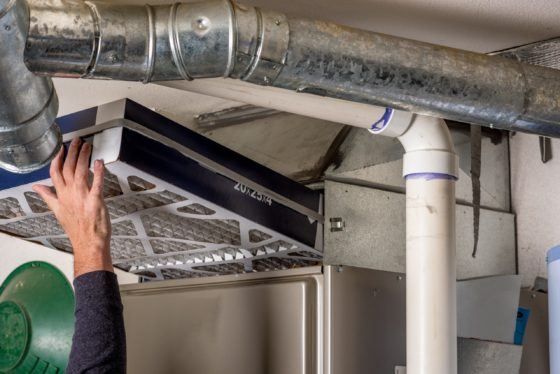
Maintenance is a key part of sustaining the lifespan of your HVAC. Nonetheless, one factor that many people tend to neglect is their furnace filter. Not using the right air filter or not replacing it frequently enough can lead to a wide range of issues. In this blog post, we will help you to understand which furnace filters are best for your HVAC system.
What Does a Furnace Filter Do?
The air filter plays an important role in preventing dust and other airborne particles from damaging your HVAC equipment. A damaged filter can allow particles to get inside the equipment. This can quickly damage any moving parts such as the fan motor.
Damage can also result if you don’t replace the filter regularly. When the filter gets overly dirty or clogged, it drastically reduces the airflow. This means that the air handler and blower need to work much harder to draw air in.
This can result in increased wear and tear and a more frequent need for repairs. This issue can also disrupt the circulation of air throughout your home.
Types of Furnace Filters
Furnace filters come in a huge variety of styles and sizes. It is important to use the correct filter for your specific system. Most residential furnace filters are 1 inch thick, but they can also be as thick as 3 inches. Look at the existing filter or opening to gain an idea of what you need.
Determining what type of filter you need can be a lot more difficult. You can find filters made from aluminum, cotton, and synthetic materials. They can be pleated or flat, disposable or washable, electrostatically charged, and more.
All of these factors play a role in determining how efficient the filter is and also its price. The fact that there are so many different types of filters can make it difficult to compare them and determine which is best. For this reason, the main thing you should always focus on is the filter’s rating.
Understanding Furnace Filter Ratings
Your furnace filter is rated based on its minimum efficiency reporting value, or MERV. Filters are rated on a 1-20 scale. A 1 filters the least amount of particles, while a 20 is almost perfect. Anything above 16 is mainly reserved for specialty purposes like sensitive electronics.
MERV 1 filters are primarily used in applications like window AC units. MERV 16 filters are used in hospitals and some commercial and industrial applications. For residential HVAC systems, most filters will range between MERV 4 and MERV 12.
If your primary concern is protecting your HVAC equipment, a MERV 4 or MERV 6 filter should be sufficient. However, if you are also concerned about indoor air quality, consider a MERV 10 or MERV 12 filter. These pricier filters may be worthwhile if you suffer from allergies or asthma indoors.
Are Washable or Disposable Filters Better?
Generally speaking, there isn’t much of a difference between washable and disposable filters in terms of efficiency. As long as both have the same rating, they will provide the same level of filtration. The only real differences are in terms of price and convenience.
Washable filters have a higher up-front cost, but save money by being reusable. These filters can be a good option if you’re willing to spend the time to clean them regularly. Still, most homeowners choose disposable filters for convenience.
The Importance of Replacing Your Filter Regularly
You should always replace or wash your filter at least once every 30 to 90 days. Waiting any longer than this risks the filter getting clogged and affecting your indoor comfort or damaging your HVAC system. You can usually get away with replacing the filter every two to three months during mild seasons. During peak seasons, expect to change your filter every three to four weeks.
It is also important to make sure that you put the new filter in the right way. Air filters can only work one way. This means that it won’t serve its purpose if you don’t install it correctly. Simply make sure that the arrow on the filter points up into your system.
Professional HVAC Services and Solutions
If you need more help with HVAC maintenance, consider giving Gallagher’s Plumbing, Heating, and Air a call. Our professionals have the experience and skills to help with all your heating and cooling needs.

